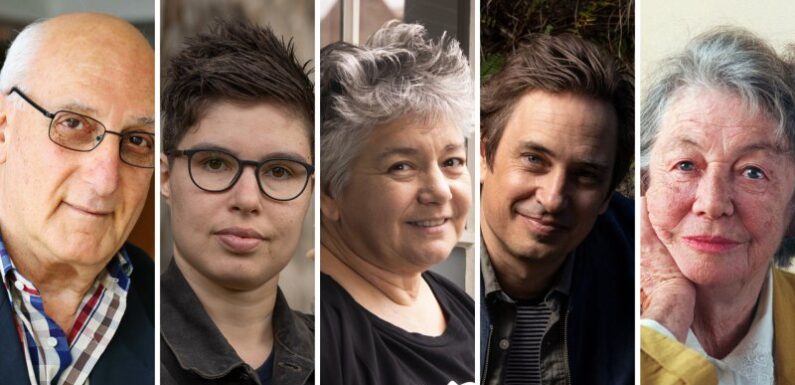
Save articles for later
Add articles to your saved list and come back to them any time.
In Brisbane’s vibrant literary scene, we take a look at five authors who have reshaped storytelling and defied conventions, taking Australian literature to new heights.
Join us as we delve into the extraordinary literary contributions of these Brisbane and southern Queensland writers, who are leaving an enduring mark on the world of literature and inspiring generations to come.
Trent Dalton
Trent Dalton’s upcoming novel is another story about Brisbane.Credit: Paul Harris
Trent Dalton burst onto the literary scene with his first novel, Boy Swallows Universe. The Ipswich-born, Brisbane-raised journalist’s book was a huge bestseller and is soon to be a series on Netflix.
Written in effervescent prose and telling the story of put-upon Eli Bell negotiating a life like no other in Brisbane in 1985, the book won awards, plaudits and revelled in Brisbane’s suburbs and … Boggo Road jail.
In October, Dalton publishes Lola in the Mirror, which he describes as “the story of my city, Brisbane, in the lead-up to hosting an Olympic Games in a state where homelessness has risen by three times the national average”.
Ellen van Neerven
Ellen van Neerven’s Personal Score is a striking addition to their body of work.Credit: Paul Harris
Personal Score, Ellen van Neerven’s latest book, is about being queer, Indigenous, and playing sport on Country.
The Mununjali Yugambeh poet, story writer and novelist won the David Unaipon Award for their first book, Heat and Light, in 2013. Since then they have published two collections of poetry – Comfort Food and Throat.
Personal Score is a striking addition to their body of work and incorporates poetry, memoir, interview, history and sporting recollections, beginning with their time as a soccer player with, among others, Brisbane’s Gap FC.
“It is a beautiful story of blackfulla love,” Chelsea Watego wrote, “– for sport, for Country. Most importantly, it’s a story of finding love for ourselves.”
Melissa Lucashenko
Melissa Lucashenko’s books are imbued with a love of Country. Credit: Renee Nowytarger
Bundjalong woman Melissa Lucashenko received the Miles Franklin Award for her sixth novel, Too Much Lip, becoming only the third Indigenous writer to win Australia’s most significant fiction prize.
The Rochedale-raised author’s books are imbued with a love of Country in northern NSW and southern Queensland.
Case in point, her upcoming epic novel, Edenglassie, beginning in the early days of colonisation before the Indigenous population was outnumbered by the intruders, then jumping forwards 200 years.
She calls it her “big book … we live with the values of Britain in the 1700s, even though we’re in the 21st century, and I want to talk about how that is not the historical norm in Australia”.
David Malouf
David Malouf’s first novel was about a wartime childhood in Brisbane.Credit: Patrick Cummins
David Malouf was a 10-year-old at West End State School when he discovered the power of story. His teacher read the class a chunk of The Iliad, which stayed with him as the siege of Troy seemed like the world of 1943, when Brisbane and Australia were waiting for the Japanese to come.
He began writing poetry as a student at the University of Queensland, but turned to prose in 1975 with Johnno, about a wartime childhood in Brisbane.
As Giramondo publisher and Western Sydney University professor Ivor Indyk said about Johnno, Malouf has “done much to bring Queensland – and Brisbane in particular – into our literature, enhancing our sense of place”.
Thea Astley
Thea Astley saw Australians “with her clear, killer eye”.Credit: Michael Clayton-Jones
The late Thea Astley was born in Brisbane in 1925 and wrote frequently about the city, northern Queensland and the scourge of development that seemed to her to be overwhelming the state.
She was a drily witty woman, a committed smoker, whose first novel was published when she was in her early 30s.
Her 1962 third novel, The Well Dressed Explorer, won the first of her four Miles Franklin awards. Her other titles include It’s Raining in Mango, Reaching Tin River, The Multiple Effects of Rain Shadow and Drylands, her final novel, for which she shared the Miles with Indigenous writer Kim Scott.
As fellow Brisbane novelist Toni Jordan once wrote: “Astley sees Australians with her clear, killer eye.”
The Booklist is a weekly newsletter for book lovers from books editor Jason Steger. Get it delivered every Friday.
Most Viewed in Culture
From our partners
Source: Read Full Article




